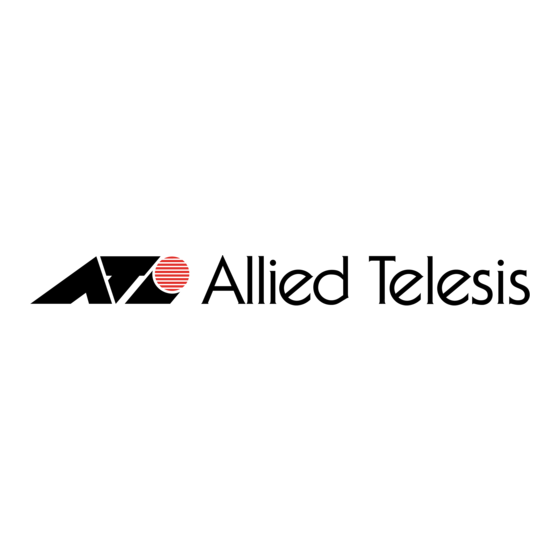AlliedView NMS
Zero Touch Service Provisioning
The AlliedView NMS allows for the rapid
deployment of multiple services (e.g. Internet
Access, IPTV video and VoIP telephony) via the
provisioning of VLANs and QoS policies across
multiple devices with a minimum of commands.
Provisioning and rollout of new services and
devices are significantly accelerated via the use
of profiles for the most common types of
services in the network.
By defining a common set of profiles NMS
enables multiple services to a subscriber to be
provisioned via a single screen.
Network Upgrades
The AlliedView NMS can perform scheduled or
unscheduled network wide firmware and
software upgrades to many of the Allied Telesis
device types.The NMS maintains control of
software releases to ensure all nodes in the
network always maintain consistent software
loads.
Northbound Interface
AlliedView NMS can interoperate with existing
Operation Support Systems (OSS) and
Business Support Systems (BSS) through
northbound protocols, such as SNMP and
XML/SOAP. On the southbound, AlliedView
NMS supports multiple protocols including
SNMP, CLI, and TR069 in future releases.
Hot Standby Failover Service
AlliedView NMS is a carrier-class system
designed to run in mission-critical environments
which require continuous and uninterrupted
access to the NMS. If a failure occurs of the
primary server an automatic switch takes place
to a redundant or hot standby server. In the
process all the functions being performed by
the primary server (i.e. the currently active-
server) are automatically assumed by a
redundant or standby server upon the failure or
sudden termination of the primary server
ensuring an uninterrupted access to NMS
functions. Failover makes the NMS systems
fault-tolerant.The process of switching over has
been designed to be smooth and automatic so
that the end-user does not notice the failure of
the primary server or the subsequent switch
over by the standby.
Allied Telesis
| Network Management Software
Hot standby failover support is provided for
both BE and FE servers.
•
BE Failover – NMS has primary and standby
BE servers which are redundant
configurations designed to provide the same
functionality. When the primary BE fails, the
standby BE takes over the functions of the
primary.The FE which is connected to the BE
which fails will automatically reconnect to the
standby BE.
•
FE Failover – User clients are connected to
the BE through FEs. If the FE to which a client
is connected fails, the client will be connected
automatically to another FE.
Technical Specifications
AlliedView NMS Minimum Server
Platform Requirements
Client:
Java enabled platform: Windows (2000/2003/XP)
Solaris 10
1GB RAM
NMS Back-end Server
Solaris Server
OS:
Solaris 10
Machine:
Sun Fire V210 (V440)
Processor: UltraSparc llli 1.34 GHz
(2@1.59 GHz)
RAM:
2 Gb (4 GB)
Disk:
70 GB 15,000 RPM SCSI (RAID 5)
Monitor:
1280 x 1024 resolution
Standard Technology Support
Standard
Technology
EJB
JAXP
JNDI
JDBC
Java RMI
JMX
JFC
JSP
Servlets
HTTP
SNMP
LDAP
XML
Description
Enterprise JavaBeans (EJB) defines an architecture for a transactional, distributed object system based
on components.
Java API for XML Processing (JAXP) provides a standard API to process XML documents using DOM,
SAX and XSLT.
Java Naming and Directory Interface (JNDI).
Java Database Connectivity (JDBC) provides a vendor and technology independent API to access data.
Remote Method Invocation (RMI) facilitates distributed computing.
Java Management Extensions (JMX) provides the tools for building distributed, Web-based solutions
for service-driven networks.
Java Foundation Classes (JFC) is a collection of widgets, facilitates building user interfaces (GUI's).
JavaServer Pages (JSP) allowing embedded Java code in HTML pages facilitates dynamic content
in Web pages.
Servlets are protocol and platform independent server side components written in Java.
HTTP facilitates a standard communication mechanism between Web browser client and
the Web server.
The Simple Network Management Protocol (SNMP) is the most widely used management protocol.
The Light Weight Directory Access Protocol (LDAP) facilitates organizing information as a directory.
XML facilitates an efficient data interchange between components of an application and between
applications.
Windows Server
OS:
Windows 2003
Machine:
Dell, IBM, etc.
Processor: 2@3.4+ GHz
(4@3.4+ GHz)
(Duo Quad 2.4Ghz)
RAM:
2GB (4 GB)
Disk:
70GB (RAID 5)
Monitor:
1280 x 1024 resolution
NMS Front-end Server
Solaris Server
OS:
Solaris 10
Machine:
Sun Fire V125
Processor: UltraSparc IIIi 1GHz
RAM:
2GB
Disk:
36GB
Windows Server
OS:
Windows 2003
Machine:
Dell, IBM, etc
Processor: Pentium D 3.4GHz
Duo Two 2.66GHz
Ram:
2GB
Disk:
36GB
Data base:
MySQL
www.alliedtelesis.com

